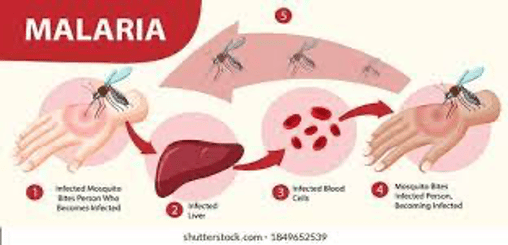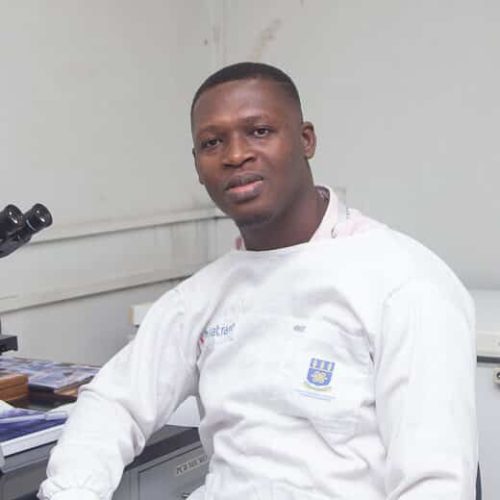Surveillance of antimalarial drug resistance in Ghana


- Surveillance of antimalarial drug resistance in Ghana
This study involves the assessment of the therapeutic efficacy and safety of antimalarial drugs for the treatment of uncomplicated P. falciparum malaria in Ghana. The study aims at providing continuous data from ten sentinel sites to enhance timely evidence-based decision making by the National Malaria Control Programme (NMCP). The assessment involves clinical, parasitological, and molecular methods. This surveillance activity is intended to be conducted every two years.
- Tracking malaria prevalence in sentinel sites in Ghana
This study is assessing the progress of interventions towards reduction of malaria prevalence in Ghana. The assessment includes the generation of data on malaria parasite positivity rates using Rapid Diagnostic Tests (mRDTs) and microscopy in 30 sentinel health care facilities across Ghana. The selected facilities are also used to monitor some malaria indicators such as adherence to the test- treat-track policy, completeness of consulting room registers, and accuracy of anti-malaria data.
- Determining whether histidine rich protein gene deletions causing negative HRP2 RDT results among symptomatic patients with confirmed falciparum malaria have reached a threshold for change in diagnostic strategy
This study aims at using samples obtained from ten randomly selected health care facilities in each of the 16 regions of Ghana to determine whether the local prevalence of mutations in the P. falciparum pghrp2/3 genes causing false negative RDT results have reached a threshold that might require a local or national change in diagnostic strategy. This surveillance activity is intended to be conducted every three years.
- Plasmodium falciparum gametocytogenesis in-vitro and in-vivo
This study aims at evaluating the in-vitro function of clinical factors and genes associated with gametocyte conversion, which is key in the design of new malaria control strategies, including new drugs and vaccines. The study also seeks to monitor the in-vivo dynamics of gametocytogenesis and maturation to provide insight into both the induction and survival of gametocytes in populations. The results of the study will allow for the identification and strategic targeting of key pathways and possibly high risk populations prior to the production of transmissible stage V gametocytes.
- Prevalence of Plasmodium falciparum parasitaemia and anaemia in children under five years of age at baseline and following annual vs. biannual indoor residual spraying (IRS) in Bunkpurugu-Yunyoo district, northern Ghana
The study aimed at assessing the cost-effectiveness of one-spray round versus two-spray rounds in the Bunkpurugu-Yunyoo district in northern Ghana using a series of cross-sectional surveys to compare pre-IRS and post-IRS anaemia and malaria parasitaemia among children under five years.
- Abuaku B, Duah-Quashie NO, Quashie N, Gyasi A, Opoku-Afriyie P, Owusu-Antwi F, Ghansah A, Malm KL, Bart-Plange C, Koram KA. Trends and predictive factors for treatment failure following artemisinin-based combination therapy among children with uncomplicated malaria in Ghana: 2005 – 2018. BMC Infect Dis 2021, 21: 1255 https://doi.org/10.1186/s12879-021-06961-4
- Abuaku B, Amoah LE, Peprah NY, Asamoah A, Amoako EO, Donu D, Adu GA, Malm KL. Malaria parasitaemia and mRDT diagnostic performances among symptomatic individuals in selected health care facilities across Ghana. BMC Public Health 2021; 21: 239 https://doi.org/10.1186/s12889-021-10290-1
- Prajapati SK, Ayanful-Torgby R, Pava Z, Barbeau MC, Acquah FK, Cudjoe E, Kakaney C, Amponsah JA, Obboh E, Ahmed AE, Abuaku BK, McCarthy JS, Amoah LE, Williamson KC. The transcriptome of circulating sexually committed Plasmodium falciparum ring stage parasites forecasts malaria transmission potential. Nat Commun. 2020; 11: 6159 https://doi.org/10.1038/s41467-020-19988-z
- Amoah LE, Abuaku B, Bukari AH, Dickson D, Amoako EO, Asumah G, Asamoah A, Peprah NY, Malm KL. Contribution of P. falciparum parasites with Pfhrp2 gene deletions to false negative PfHRP2 based malaria RDT results in Ghana: A nationwide study of symptomatic malaria patients. PLoS One 2020; 15(9): e0238749 https://doi.org/10.1371/journal.pone.0238749
- Abuaku B, Duah-Quashie NO., Quaye L, Matrevi SA, Quashie N, Gyasi A, Owusu-Antwi F, Malm K, Koram K. Therapeutic efficacy of artesunate- amodiaquine and artemether-lumefantrine combinations for uncomplicated malaria in 10 sentinel sites across Ghana: 2015-2017. Malar J 2019; 18: 206 https://doi.org/10.1186/s12936-019-2848-1
- Usui M, Prajapati KS, Anyangul-Torgby R, Acquah KF, Cudjoe E, Kakaney C, Amponsah AJ, Obboh KE, Reddy KD, Barbeau CM, Simons ML, Czesny B, Raiciulescu S, Oslen C, Abuaku B, Amoah EL, Williamson CK. Plasmodium falciparum sexual differentiation in malaria patients is associated with host factors and GDV1-dependent genes. Nature Communication 2019; 10: 2140 https://doi.org/10.1038/s41467-019-10172-6
- Abuaku BK, Ahorlu C, Psychas P, Ricks P, Oppong S, Mensah S, Sackey W, Koram K. Impact of Indoor Residual Spraying on Malaria Parasitaemia in the Bunkpurugu-Yunyoo district in northern Ghana. Parasit Vectors 2018; 11: 555 https://doi.org/10.1186/s13071-018-3130-z
- Abuaku BK, Mensah BA, Ofori MF, Myers-Hansen J, Derkyi-Kwarteng AN, Essilfie F, Dokurugu M, Amoakoh E, Koram KA, Ghansah A. Efficacy of Artesunate/Amodiaquine in the Treatment of Uncomplicated Malaria among children in Ghana. Am J Trop Med Hyg 2017; 97 (3): 690-695 https://doi.org/10.4269/ajtmh.15-0826
- Abuaku B, Peprah NY, Ahorlu C, Mohammed M, Quashie N, Addo C, Amoako EO, Malm K, Bart-Plange C, Koram K. Tracking Malaria Slide Positivity Rates in 30 Sentinel Sites across Ghana (Abstract # 1022). https://www.astmh.org/ASTMH/media/2017-Annual-Meeting/ASTMH-2017-Abstract-Book.pdf
- Abuaku B, Psychas P, Ricks P, Ahorlu C, Mumba P, Mensah D, Mensah S, Sackey W, Oppong S, Koram K. Impact of One vs. Two Rounds of Annual Indoor Residual Spraying (IRS) on Malaria Parasitaemia in Children in Northern Ghana (Abstract # 907). https://www.astmh.org/ASTMH/media/Documents/ASTMH-2015-Abstract-Book-Final.pdf
My Bibliography: https://www.ncbi.nlm.nih.gov/myncbi/1XY1alPPMsWUef/bibliography/public/







